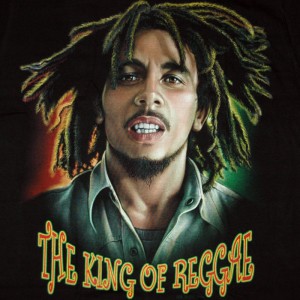The Undying Legacy of Bob Marley
Born on February 6, 1945 in rural St. Ann's Parish, Jamaica, no one in Robert Nesta Marley's life had any idea of the kind of life this young son of a middle-aged white father and teenaged black mother would lead. Known today as an iconic figure in the Reggae world, Bob Marley was the first Jamaican artist to reach the level of international superstardom. He began is musical journey at a young age.
He left home at 14 to pursue a music career in Kingston, Jamaica, becoming a pupil of local singer and devout Rastafarian Joe Higgs. He recorded his first single, "Judge Not," in 1962. In 1963 Bob Marley teamed with fellow singers Peter Tosh, Bunny Livingston, Junior Braithwaite, Beverly Kelso, and Cherry Smith to form the vocal group the Teenagers; later rechristened the Wailing Rudeboys, and later simply The Wailers. The group signed on with producer Coxsone Dodd's legendary Studio One and recorded their debut, "I'm Still Waiting." When Braithwaite and Smith exited the Wailers , Bob Marley assumed lead vocal duties, and in early 1964 the group's follow-up, "Simmer Down," topped the Jamaican charts. A series of singles including "Let Him Go (Rude Boy Get Gail)," "Dancing Shoes," "Jerk in Time," "Who Feels It Knows It," and "What Am I to Do" followed, and in all, the Wailers recorded some 70 tracks before breaking up in 1966. After returning to Jamaica nearly a year later, Bob Marley re-formed the Wailers with Livingston and Tosh, releasing "Bend Down Low" on their own short-lived Wail 'N' Soul 'M label. It was around this time that Marley and the rest of the group devoted themselves to the teachings of the Rastafari faith, a cornerstone of Bob Marley's life and music until his death. The Wailers went on to record a wealth of new material including "My Cup," "Duppy Conqueror," "Soul Almighty," and "Small Axe." 1973's "Catch a Fire" was the first of The Wailers' albums released outside of Jamaica, and immediately earned worldwide acclaim and industry respect. The follow-up, "Burnin", launched the track "I Shot the Sheriff," later a Top Ten hit for Eric Clapton in 1974. 1977's "Exodus" was Bon Marley's biggest record to date, generating the hits "Jamming," "Waiting in Vain," and "One Love/People Get Ready." "Uprising" was the final album released in Bob Marley's lifetime. He died May 11, 1981, at the age of 36 of untreatable cancer that had spread to his brain, lungs and liver. Today his legacy lives on. Bob Marley songs gave voice to the day-to-day struggles of the Jamaican experience, vividly capturing not only the plight of the country's impoverished and oppressed, but also the devout spirituality that remains their source of strength. Now, more than a quarter century after his death, Bob Marley is still one of the most popular reggae artists in the world.
He left home at 14 to pursue a music career in Kingston, Jamaica, becoming a pupil of local singer and devout Rastafarian Joe Higgs. He recorded his first single, "Judge Not," in 1962. In 1963 Bob Marley teamed with fellow singers Peter Tosh, Bunny Livingston, Junior Braithwaite, Beverly Kelso, and Cherry Smith to form the vocal group the Teenagers; later rechristened the Wailing Rudeboys, and later simply The Wailers. The group signed on with producer Coxsone Dodd's legendary Studio One and recorded their debut, "I'm Still Waiting." When Braithwaite and Smith exited the Wailers , Bob Marley assumed lead vocal duties, and in early 1964 the group's follow-up, "Simmer Down," topped the Jamaican charts. A series of singles including "Let Him Go (Rude Boy Get Gail)," "Dancing Shoes," "Jerk in Time," "Who Feels It Knows It," and "What Am I to Do" followed, and in all, the Wailers recorded some 70 tracks before breaking up in 1966. After returning to Jamaica nearly a year later, Bob Marley re-formed the Wailers with Livingston and Tosh, releasing "Bend Down Low" on their own short-lived Wail 'N' Soul 'M label. It was around this time that Marley and the rest of the group devoted themselves to the teachings of the Rastafari faith, a cornerstone of Bob Marley's life and music until his death. The Wailers went on to record a wealth of new material including "My Cup," "Duppy Conqueror," "Soul Almighty," and "Small Axe." 1973's "Catch a Fire" was the first of The Wailers' albums released outside of Jamaica, and immediately earned worldwide acclaim and industry respect. The follow-up, "Burnin", launched the track "I Shot the Sheriff," later a Top Ten hit for Eric Clapton in 1974. 1977's "Exodus" was Bon Marley's biggest record to date, generating the hits "Jamming," "Waiting in Vain," and "One Love/People Get Ready." "Uprising" was the final album released in Bob Marley's lifetime. He died May 11, 1981, at the age of 36 of untreatable cancer that had spread to his brain, lungs and liver. Today his legacy lives on. Bob Marley songs gave voice to the day-to-day struggles of the Jamaican experience, vividly capturing not only the plight of the country's impoverished and oppressed, but also the devout spirituality that remains their source of strength. Now, more than a quarter century after his death, Bob Marley is still one of the most popular reggae artists in the world.



Comments